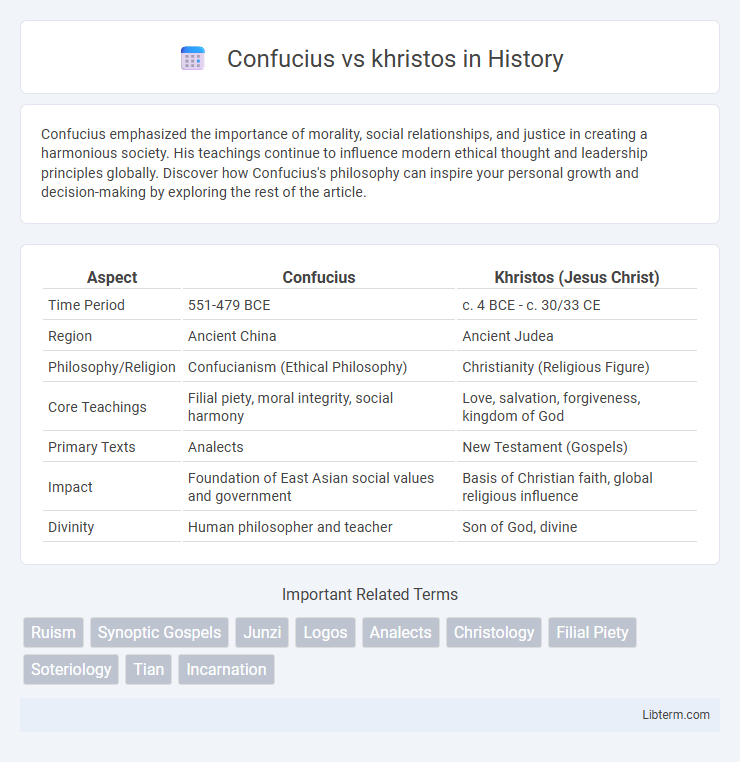Confucius emphasized the importance of morality, social relationships, and justice in creating a harmonious society. His teachings continue to influence modern ethical thought and leadership principles globally. Discover how Confucius's philosophy can inspire your personal growth and decision-making by exploring the rest of the article.
Table of Comparison
| Aspect | Confucius | Khristos (Jesus Christ) |
|---|---|---|
| Time Period | 551-479 BCE | c. 4 BCE - c. 30/33 CE |
| Region | Ancient China | Ancient Judea |
| Philosophy/Religion | Confucianism (Ethical Philosophy) | Christianity (Religious Figure) |
| Core Teachings | Filial piety, moral integrity, social harmony | Love, salvation, forgiveness, kingdom of God |
| Primary Texts | Analects | New Testament (Gospels) |
| Impact | Foundation of East Asian social values and government | Basis of Christian faith, global religious influence |
| Divinity | Human philosopher and teacher | Son of God, divine |
Introduction: Contrasting Confucius and Khristos
Confucius, the ancient Chinese philosopher, emphasized ethics, social harmony, and filial piety, shaping East Asian cultures through Confucianism. Khristos, or Christ, central to Christianity, focuses on salvation, divine love, and spiritual redemption, influencing Western religious thought profoundly. The contrasting foundations highlight Confucius's pragmatic moral teachings versus Khristos's theological and messianic role.
Historical Contexts of Confucius and Khristos
Confucius, an influential Chinese philosopher of the 6th century BCE, shaped Eastern ethical and social thought through his teachings on virtue, filial piety, and proper governance during the late Zhou dynasty. Khristos, derived from the Greek term for "anointed one," refers to Jesus Christ, a 1st-century CE Jewish preacher whose life and resurrection became the foundation of Christianity amid Roman occupation in Judea. The historical contexts of Confucius emphasize Confucianism's role in developing moral philosophy and statecraft in ancient China, whereas Khristos marks the origins of Christian theology and its impact on Western religious and cultural history.
Philosophical Foundations: Ethics and Morality
Confucius emphasized ethical conduct through the concepts of Ren (benevolence), Li (ritual propriety), and Xiao (filial piety), forming the core of social harmony and moral behavior within society. Khristos, rooted in Christian teachings, centers on divine love, grace, and salvation, advocating for forgiveness, humility, and the inherent worth of all individuals as reflections of God's moral law. Both philosophical foundations underscore the transformation of the individual's character but diverge in their ultimate sources of moral authority--Confucianism in human-centered social order and Khristianity in divine command and spiritual redemption.
Spiritual Beliefs: The Divine vs. The Human
Confucius emphasized moral virtues and social harmony rooted in human ethics without asserting divine nature, framing spiritual beliefs around human-centered principles and ancestral reverence. Khristos, referring to Christ in Christian theology, embodies both divine and human natures, asserting a unique incarnation of God in human form to reconcile humanity with the divine. This contrast reflects Confucius' focus on practical ethics and social order versus Khristos' foundation in supernatural salvation and divine grace.
Approach to Society and Governance
Confucius emphasized a hierarchical social order based on moral virtues, filial piety, and ritual propriety to create harmony within society and government, advocating for rulers to lead by example and cultivate virtue in citizens. Khristos, rooted in Christian theology, centers governance on love, forgiveness, and the inherent worth of all individuals, promoting a spiritual kingdom that transcends earthly political structures. While Confucius offers a practical, ethical framework for societal roles and statecraft, Khristos presents a transformative vision prioritizing compassion and equality as foundations for community and leadership.
Teachings on Family and Social Relationships
Confucius emphasized filial piety, respect for elders, and hierarchical harmony within the family as foundational to social stability and moral development. Khristos teachings, rooted in Christ's message, highlight love, compassion, and forgiveness as guiding principles for family and broader social relationships. Both frameworks promote ethical conduct but differ in approach: Confucianism relies on structured roles and duties, while Khristos advocates for grace and unconditional love.
Methods of Spreading Teachings
Confucius spread his teachings primarily through oral tradition, engaging disciples in dialogues and encouraging the memorization of classic texts like the Analects, which were later compiled by his followers. Khristos, referring to the figure of Christ, disseminated his message through parables, sermons, and direct interactions, with his teachings recorded by apostles and early Christians in the New Testament. While Confucius relied on scholarly disciples to preserve and transmit his philosophy, Khristos' methods emphasized faith-based preaching and written scripture to reach a broader and diverse population.
Influence on Eastern and Western Cultures
Confucius shaped Eastern cultures by emphasizing social harmony, filial piety, and ethical governance, foundational principles in Chinese, Korean, and Japanese societies. Khristos, central to Christianity, influenced Western cultures through doctrines of salvation, compassion, and moral law, deeply impacting European art, philosophy, and legal systems. Both figures established enduring moral frameworks that continue to guide social values and cultural identities across the globe.
Legacy and Modern-Day Relevance
Confucius' legacy endures through Confucianism's emphasis on ethics, social harmony, and education, shaping East Asian cultures and governance for over two millennia. Khristos, representing Christ in Christianity, has profoundly influenced Western moral values, law, and art, with Christianity remaining a major global faith. Both figures continue to inspire modern philosophical thought, religious practice, and cultural identity worldwide.
Comparative Analysis: Philosophical Impact and Spiritual Significance
Confucius, the ancient Chinese philosopher, emphasized ethics, social harmony, and filial piety, shaping East Asian moral philosophy and governance, while Khristos, central to Christian theology, symbolizes salvation, divine incarnation, and spiritual redemption. Confucius' teachings fostered a structured societal framework prioritizing human relationships and communal responsibility, contrasting with Khristos' focus on personal faith, salvation, and transcendence of worldly existence. Both figures profoundly influenced cultural values and spiritual beliefs, yet their philosophical impacts diverge between pragmatic social order and metaphysical salvation.
Confucius Infographic

 libterm.com
libterm.com